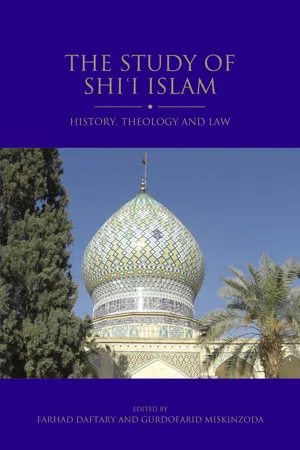
The Study of Shi'i Islam
History, Theology and Law
- 640 pages
- English
- ePUB (mobile friendly)
- Available on iOS & Android
The Study of Shi'i Islam
History, Theology and Law
About This Book
Shi'i Islam, with its rich and extensive history, has played a crucial role in the evolution of Islam as both a major world religion and civilization. The prolific achievements of Shi?i theologians, philosophers and others are testament to the spiritual and intellectual wealth of this community. Yet Shi?i studies has unjustly remained a long-neglected field, despite the important contribution that Shi'ism has made to Islamic traditions. Only in recent decades, partially spurred by global interest in political events of the Middle East, have scholars made some significant contributions in this area. The Study of Shi'i Islam presents papers originally delivered at the first international colloquium dedicated exclusively to Shi'i studies, held in 2010 at The Institute of Ismaili Studies, London. Within the book are eight sections, namely, history, the Qur'an and its Shi'i interpretations, hadith, law, authority, theology, rites and rituals, and intellectual traditions and philosophy.
Each section begins with an introduction contextualizing the aspects of studying Shi'i Islam particular to its theme, before going on to address topics such as the state of the field, methodology and tools, and the primary issues with which contemporary scholars of Shi'i studies are dealing. The scope and depth here covered makes this book of especial interest to researchers and students alike within the field of Islamic studies. The volume benefits from the diverse expertise of nearly 30 world-class scholars, including Mohammad-Ali Amir-Moezzi, Meir M. Bar-Asher, Farhad Daftary, Daniel De Smet, Gerald R. Hawting, Nader El-Bizri, Etan Kohlberg, Wilferd Madelung, Andrew Newman, Ismail K. Poonawala, Sabine Schmidtke and Paul E. Walker.
Frequently asked questions
Information
Table of contents
- Cover
- Author biography
- Title page
- Copyright page
- Shi‘i Heritage Series
- Table of Contents
- Foreword by Mohammad Ali Amir-Moezzi
- Preface
- Contributors
- Note on Transliteration and Dates
- Abbreviations
- PART I: HISTORY AND HISTORIOGRAPHY
- Introduction
- 1. Reflections on the Expression dīn ʿAlī: The Origins of the Shiʿi Faith
- 2. The Study of the Ismailis: Phases and Issues
- 3. Al-Maqrīzī’s Connection to the Fatimids
- PART II: THE QURʾAN AND ITS SHIʿI INTERPRETATIONS
- Introduction
- 4. What Defines a (Pre-modern) Shiʿi Tafsīr? Notes towards the History of the Genre of Tafsīr in Islam, in the Light of the Study of the Shiʿi Contribution
- 5. The Tafsīr of al-Ḥibarī (d. 286/899): Qurʾanic Exegesis and Early Shiʿi Esotericism
- 6. The Empire Writes Back: Fatimid Ismaili Taʾwīl (Allegoresis) and the Mysteries of the Ancient Greeks
- 7. The Authority to Interpret the Qurʾan
- PART III: SHIʿI ḤADĪTH
- Introduction
- 8. Writing and Resistance: The Transmission of Religious Knowledge in Early Shiʿism
- 9. Pre-Būyid Ḥadīth Literature: The Case of al-Barqī from Qumm (d. 274/888 or 280/894) in Twelve Sections
- 10. The Story of ‘Pen and Paper’ and its Interpretation in Muslim Literary and Historical Tradition
- PART IV: SHIʿI LAW
- Introduction
- 11. Renunciation (Zuhd) in the Early Shiʿi Tradition
- 12. The Evolution of al-Qāḍī al-Nuʿmān’s Theory of Ismaili Jurisprudence as Reflected in the Chronology of his Works on Jurisprudence
- 13. The Theory of Māl among the Zaydīs
- PART V: AUTHORITY
- Introduction
- 14. ‘Seeking the Face of God’: The Safawid Ḥikmat Tradition’s Conceptualisation of Walāya Takwīniyya
- 15. The Role of the Imam-caliph as Depicted in Official Treatises and Documents Issued by the Fatimids
- 16. ‘Minority Reports’: Twelver Shiʿi Disputations and Authority in the Būyid Period
- PART VI: THEOLOGY
- Introduction
- 17. Early Imāmī Theology as Reflected in the Kitāb al-kāfī of al-Kulaynī
- 18. Al-Shaykh al-Ṭūsī: His Writings on Theology and their Reception
- PART VII: RITES AND RITUALS
- Introduction
- 19. ʿĀshūrāʾ Rituals, Identity and Politics: A Comparative Approach (Lebanon and India)
- 20. The Luminous Lamp: The Practice of Chirāgh-i rawshan among the Ismailis of Central Asia
- PART VIII: PHILOSOPHY AND INTELLECTUAL TRADITIONS
- Introduction
- 21. Shahrastānī’s Ḥanīf Revelation: A Shiʿi Philosophico-Hermeneutical System
- 22. Philosophising at the Margins of ‘Shiʿi Studies’: Reflections on Ibn Sīnā’s Ontology
- Epilogue by Azim Nanji
- Endnotes